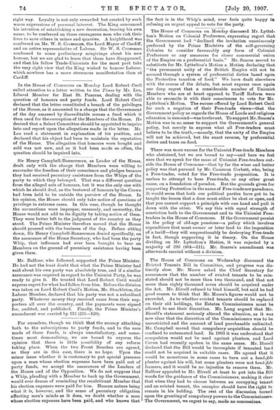There was more excuse for the Unionist Free-trade Members who
abstained, but we are bound to say—and here we feel sure that we speak for the mass of Unionist Free-traders out- side the House of Commons—that by far the wiser and better policy was that pursued by Mr. Cameron Corbett, who, being a Free-trader, voted for the Free-trade proposition. It is useless to attempt to base Free-trade, or any other great cause, on a foundation of paradox. But the grounds given for supporting Protection in the name of Free-trade are paradoxes. It would seem that both our political parties have got to be taught the lesson that a door must either be shut or open, and that you cannot support a principle with one hand and pull it down with the other. We say this with equal strength of conviction both to the Government and to the Unionist Free- traders in the House of Commons. If the Government persist in the policy of old-age pensions—a policy which involves expenditure that must sooner or later lead to the imposition of a tariff—they will unquestionably be destroying Free-trade in fact, though supporting it in theory. On the House dividing on Mr. Lyttelton's Motion, it was rejected by a majority of 293 (404-111). Mr. Soares's amendment was afterwards carried without a division.






































 Previous page
Previous page